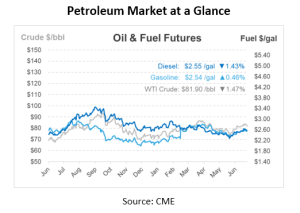
Beryl’s Aftermath: Power Outages Persist, but Oil Supply Concerns Fade
Remnants of Hurricane Beryl are making their way through the states, yet oil prices are declining again this morning with no notable supply disruptions from the storm. Crude futures are down by over 40c/bbl this morning after experiencing losses yesterday. Markets are watching today’s Fed testimony to Congress about the future of inflation with the US monetary policy.
Following Hurricane Beryl’s landfall in Texas, the Port of Corpus Christi reopened yesterday afternoon. Meanwhile, the port of Houston is anticipated to resume regular business on Wednesday once authorities have verified that there hasn’t been any significant damage to property. Several producers and crude processing facilities are also ramping up output after preemptively reducing activities ahead of the storm. With over 40% of the nation’s oil and 20% of its gas production, Texas produces the most oil and gas in the United States. It is also a hub for transportation and processing. Any severe weather might affect imports and exports, as well as the amount of petroleum products produced.
Beryl caused a disruption at a Galveston Bay refinery, leading to a brief power outage and subsequent flaring at the 631,000 bpd facility, and according to the EIA the nation’s largest refinery. This morning, over 2.3 million Texans remain without power, particularly in the Galveston area, with authorities warning that outages could persist for days. While supply concerns are currently minimal, the heavy rains and flooding may reduce fuel demand in the coming days.
In the first couple of days of July, Russia’s oil processing increased to over 9 Mbpd, around 100,000 bpd above its target under the OPEC agreement, as the country’s downstream sector finished seasonal maintenance and repairs following drone strikes by the Ukrainian government. On July 1-3, refinery runs increased by nearly 325,000 bpd, compared to the norm for June, when many autonomous facilities were the target of one of the biggest drone swarm attacks since the start of the conflict in Ukraine. Saudi Arabia’s crude exports to China are expected to rebound to at least 44 million barrels in August, up from 36 million barrels in July, following steep price cuts by the state energy firm.
On the backburner for the past few days due to Hurricane Beryl, but creeping back up for market participants is geopolitical tensions in Gaza. A potential ceasefire deal in Gaza could alleviate concerns about global crude supply disruptions. Senior U.S. officials engaged in talks on Monday in Egypt, but the White House reported that gaps remained between the parties. Hamas warned that a new Israeli push into Gaza could jeopardize the potential agreement.

This article is part of Daily Market News & Insights
Tagged:
MARKET CONDITION REPORT - DISCLAIMER
The information contained herein is derived from sources believed to be reliable; however, this information is not guaranteed as to its accuracy or completeness. Furthermore, no responsibility is assumed for use of this material and no express or implied warranties or guarantees are made. This material and any view or comment expressed herein are provided for informational purposes only and should not be construed in any way as an inducement or recommendation to buy or sell products, commodity futures or options contracts.





